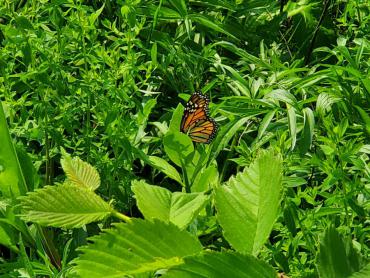Help monarchs, kick off ‘National Pollinator Week’
National Pollinator Week is a time to celebrate pollinators and spread the word about what you can do to protect them. This is a necessary step toward addressing the urgent issue of declining pollinator populations.
As part of National Pollinator Week, June 17-23, the City of Madison Engineering and Parks Divisions would like to remind the community of the importance of Monarchs, other pollinators and proper pollinator habitat management.
The monarch butterfly population has decreased drastically in the last few decades, and a main reason is a decrease in where they can lay eggs. Monarchs can only lay eggs on milkweed plants. Unfortunately, there has been significant loss of the milkweed plants, according to the National Park Service. Milkweed grows on medians, edges of parking lots, managed meadows, native no mows, gardens and swampy areas.
Managed meadow, no mow prairies and other marginal/weedy areas provide good conditions for milkweed to thrive. These areas also are prime areas for invasive species, such as wild parsnip and Canadian thistle. Invasive or noxious weed species left unchecked will prevent milkweed and other native species beneficial to pollinators from establishing and spreading in an area. Strategic mowing is often necessary for managing these areas. While some mowing may stimulate milkweed growth and provide fresh plants for egg laying that is preferred by monarchs, too frequent or improperly timed mowing can harm the population growth.
The City is working to minimize its mowing impact on the monarchs in these areas with properly timed mowing. City Engineering owns 1,200 acres of land. Parks owns more than 5,700 acres. The Engineering and Parks Divisions mow managed meadow and no mow prairie areas annually or biannually and manage invasive species as needed. Throughout the summer, Engineering and Parks spot mow areas of invasive noxious species with an emphasis on preserving habitat that is key to pollinator survival.
Pollination happens when pollen grains are moved between two flowers of the same species by wind or animals. Successful pollination results in the production of healthy fruit and fertile seeds, allowing plants to reproduce. Without pollinators, we wouldn’t have these crops. Bees, flies, moths, butterflies and some species of birds are pollinators.
What you can do for the pollinators:
- Create a pollinator-friendly garden habitat.
- Design your garden so there is a continuous succession of plants flowering from spring through fall.
- Plant native to your region using plants that provide nectar for adults plus food for insect larvae, such as milkweed for monarchs.
- Avoid pesticides.
- Supply water for all wildlife.
- Provide water for butterflies without letting it become a mosquito breeding area.
If you’d like help curating a pollinator-friendly habitat, reach out to Madeline Dumas, City of Madison Engineering Greenway Vegetation Coordinator at mdumas2@cityofmadison.com.
Contacts
- Hannah Mohelnitzky, City of Madison Engineering Division Public Information Officer , 608-242-6003, hmohelnitzky@cityofmadison.com
- Ann Shea, City of Madison City of Madison Parks Division Public Information Officer, 608-266-5949 , ashea@cityofmadison.com
- Madeline Dumas, City of Madison Engineering Greenway Vegetation Coordinator, 608-266-9525, mdumas2@cityofmadison.com
